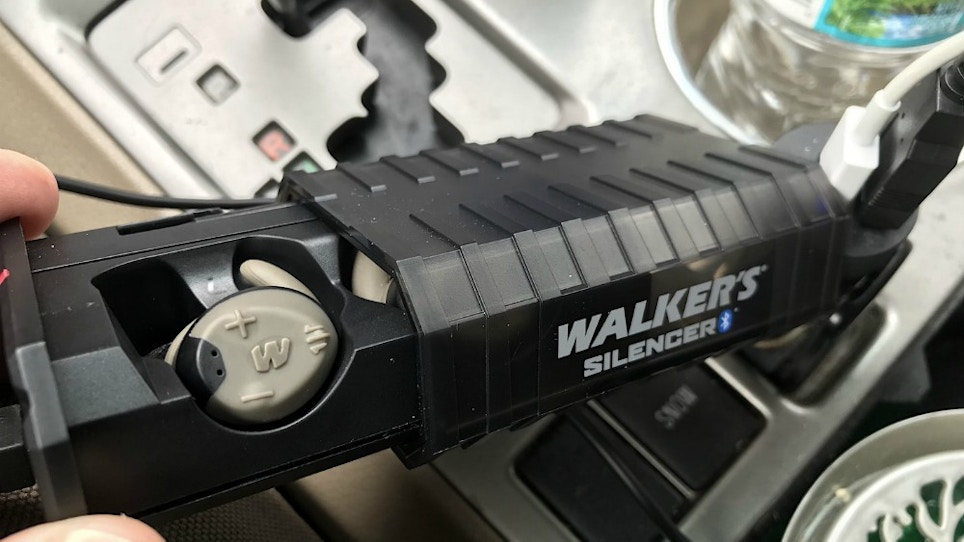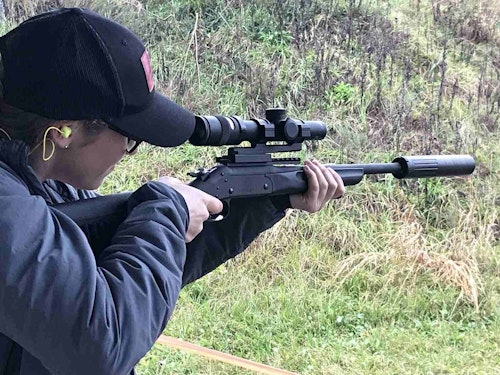
The Walker's Silencer BT can be charged in a vehicle or at home in its protective case. (Photo: Alan Clemons)
Protecting my hearing wasn't a concern back in the early 1980s when my concert checklist included Van Halen, Scorpions, Judas Priest, Alabama and one incredibly loud night in Birmingham an arm's length from triple-stacked speakers listening to Blackfoot, Molly Hatchet and .38 Special.
I couldn't hear out of my left ear for four days after that show. We poked fun at another friend of ours who wore ear plugs to concerts and later when he fronted his own band while we were in college. He was the smart one, of course.
At the target range we always wore ear muffs while shooting the rifles. They were inexpensive but they blunted some of the noise. But in the stand while hunting deer, or toting shotguns for ducks and doves? Bah. Who needed muffs? That was crazy to wear them while hunting. You might not hear the quack of a mallard or crack of deer's hoof on a stick.
It was bad then to not do more to protect my hearing. Bad is a nice term, I guess. It was really, really, really stupid of me to not do more, but back in the 1970s and '80s, hearing protection wasn't a big deal. You shot guns, you hunted, you drove with the car windows down and you played loud music. With time and age come wisdom for many things including learning how loud sounds cause hearing loss.
Today, I wear muffs when I run the weed whacker, leaf blower and lawn mower. If I'm at the shooting range I may have in foam plugs and muffs or some bluetooth decibel-suppression ear plugs. While hunting, I'll have something that increases sounds but suppresses the report of a shot. When I'm flying, I'll wear foam plugs or the bluetooth plugs (partly to let other passengers know I don't want to talk with them).
Hearing loss is cumulative. That means all those years of lawn mowing, loud concerts, driving around with my windows down blasting "Rock You Like A Hurricane," shooting guns at the range and hunting, covering sports events at Talladega and college football games, and anything else noisy built up to tear down my hearing.
Bit by bit, chip by chip, tiny hair by damaged tiny hair inside my ears, my hearing declined. Yours probably has, too. (I said, yours probably has, too!) I had mine checked about seven or eight years ago. The audiologist said there was a gap, but otherwise I still had good hearing.
I can hear a shad flip on the pond when I'm fishing and a turkey gobble in the woods. I can hear a mad coyote huffing at me in the brush and ducks making the turn on decoys. But at dinner in a restaurant with everyone talking? I smile and nod sometimes, hoping I'm not agreeing to do something weird.
From the National Institute on Deafness and Other Communication Disorders, here are decibel levels for some normal sounds we encounter:
- Normal conversation — 60-70 dB
- Movie theater — 74-104 dB
- Motorcyles and dirt bikes — 80-110 dB
- Music through headphones at maximum volume, sporting events, and concerts — 94-110 dB
- Sirens — 110-129 dB
- Fireworks show — 140-160 dB
Hunting rifles, pistols and shotguns are about 140dB and above, depending on the caliber or gauge. If you're shooting at a range with a roof or walls the sounds can reverberate or be amplified.
Years ago I was standing near a guy zeroing his .454 Casul revolver and for whatever reason, my hearing protection didn't suppress the sound. I yelled, grabbed my head and bent over like someone had hit me with a 4x4. The other guys thought I'd been hit. It was terrible.

Help Your Customers
Whether your customers are zeroing optics and testing patterns at the range, in the field hunting, or "running a rig" at a competition, many of them probably are using hearing protection.
As a retailer you can help them make smart decisions about this when they're shopping. Even having a box of foam earplugs by the register as an impulse buy is a good reminder. For more advanced systems, knowing about the ear muffs and buds available and being able to explain that may make your customers more appreciative.
There's nothing wrong with wearing hearing protection. It's not unmanly or weird. There's something for everyone.
Bluetooth Earbuds
Whether it's something like the Walker's Silencer BT or Sport Ear by Axil, these in-the-ear units can provide a more precise fit to your ear canal.
Standard buds like the Walker's models have three sizes of plugs and fins to help with the correct fit. I used some of these for more than six months and they were super at the range, in the field and on the plane. The volume worked great and they easily suppressed noises from full-auto rifles, large-caliber rifles, close and far blasts, and the Chatty Cathy a few rows behind on a long flight. My only trouble was with the free app; I'm told an upgraded Version 2.0 of the unit is coming this summer.
With models like the Sport Ear from Axil, you can get custom fittings to perfectly fit your ear canal and outer ear. These offer a true, customized protective device that blocks outer noise and, with the inclusion of a suppression system and/or bluetooth, offers more protection along with the ability to listen to your phone or other devices. This would be a great thing to have in your store, when possible, as a special "hunter's pre-season weekend."
Ear Muffs
Ear muffs are the easiest to use because they only require two things: remembering to take them, and putting them on your head.
I'm not going to tell you that Howard Leight or Walker's or Peltor has the best muffs in the world. I've used all of them at different times, at ranges shooting or around different firearms, at loud events, and I never have had any issues with any of them. The volume, suppression, fit, comfort and adjustability worked great with all of them.
What I will say is all three brands offer high-quality hearing protection with great features. They will help protect your hearing and give you an edge in the field. Ask your sales reps about these brands and models.
Foam Plugs
If you're looking for the most inexpensive, easy-to-use protection, you can't beat foam plugs. Once inserted into your ear canal — and not just crammed into the outer part because you didn't do it correctly — they will expand to fill the ear canal and block noises.
Will foam plugs block noises like the muffs or buds with suppression systems? No. But the foam plugs are better than nothing at all. They come in different sizes, shapes and colors and can fit youth to adult.





